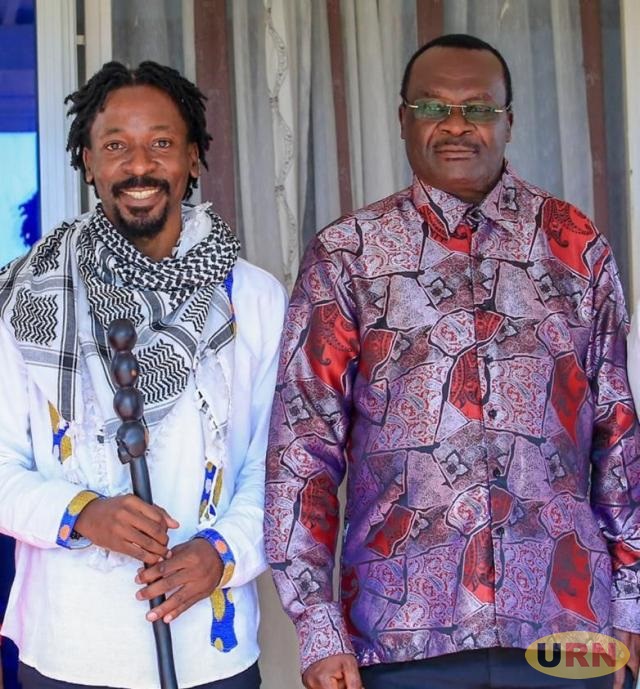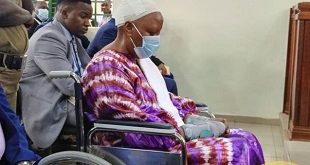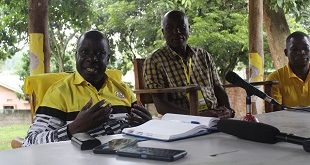
Kampala, Uganda | THE INDEPENDENT | As the dust settles from the Christmas and New Year festivities, Isaac Ssemakadde’s message to his “Radical New Bar” still hangs in the air. “I won’t be indulging in festive cheer, as our struggle against AG Nsumikambi and Injustice Ssekaana is far from over” said Ssemakadde.
The President of Uganda Law Society was referring to his fight against the Kiryowa Kiwanuka Nsumikambi Mugambe, the Attorney General of Uganda. Ssemakadde deliberately refers to Justice Ssekaana as injustice.
Justice Musa is a Judge with the High Court of Uganda and Head of its Civil Division. Ssemakadde in his message issued on the eve of Christmas day asked what he described as “Foot soldiers of the Radical Bar” to forego the comforts of the season and instead “gather evidence, share it with me and together let’s ignite a blaze against injustice”.
The battle lines drawn
Some lawyers and legal experts have indicated to Uganda Radio Network that Ssemakadde’s choice of words appears like he and his “New Radical Bar” is determined to challenge members of the bench as 2025 begins to take shape.
It is anticipated that the nation will see members of the judiciary exposed through dossiers to the mainstream media or social media.
Ssemakadde has issued three Executive Orders since the end of September 2024 when was elected as the President of the Uganda Law Society.
These include the one expelling the Attorney General and the Solicitor General and their representatives from Uganda Law Society, the one recalling un elected Society representatives to the Judicial Service Commission, and more recently, the one calling for the boycott of Judge Musa Ssekaana.
Ssemakadde also directed Ssemakadde also withdrew the ULS “Award of Excellence from the Bench” awarded to Judge Musa Ssekaana in 2021.
The society said at least 18 instances of judicial misconduct had been attributed to Judge Musa Ssekaana who heads the Civil Division of the High Court.
The law Society said Musa Ssekaana faced accusation of abuse of power, bias and prejudice. The order urged the members of ULS to boycott judge Ssekaana for one month.
The Law Society President in November attacked the Director of Public Prosecutions, Hon. Jane Abodo and Attorney General, Kiwanuka Kiryowa accusing them of frustrating access to justice.
In video widely shared on social media, Ssemakadde was accused of using derogatory language to describe the Director of Public Prosecutions (DPP).
He expressed his disapproval of the DPP by describing her by her reproductive organ and then as a ‘pumpkin.’ Ssemakadde’s choice of words against the judicial officers has earned him admiration and disapproval in equal terms.
The Institute for African Women in Law (IAWL) and the Ugandan Women Lawyers Association (FIDA-Uganda) issued a statement in which they vehemently the sexist and personal attacks against Jane Abodo.
“His choice of words does not only denigrate the DPP in question but also signifies how prevalent and deep-seated women’s objectification and denigration, a form of gender stereotyping, is within the legal profession and the larger society” said IAWL.
Dr. Busingye Kabumba, a Lecturer on Law, School of Law, Makerere University noted that though sections of the public don’t agree with Ssemakadde’s perceived derogatory language, her could be one of the few who have dared stare the leaders in the judiciary in the face.
“Of course they may say some bad words here and there. That is terrible. We condemn it. But those who are condemning it with very good statements are quiet about Justice Kisakye, are quiet about everyday substantial violations. So the hope I think are those Ugandan who are willing to remove the ties and courts as they case maybe. May be even all their clothes when the occasion demands it and speak truth to power, “suggests Kabumba.
Appearing on Capital Radio’s Capital Gang, Lawyer Robert Kirunda seemed to disagree with the Law Society President’s attack on Judge Ssekaana.
“Ssemakadde, attacking Judge Musa Ssekaana, I wouldn’t do it. I have many issues with many judges, but my style is not that. There is a reason why the Judicial Oath is taken: to administer justice without fear, favor, ill will, or affection. That job is not easy. Is there a need to reflect internally on what is going on? Absolutely,” said Kirunda.
The issue of on whether lawyers should boycott events where judicial officers are in attendance or appearing before individual judges like Musa Ssekaana has been on even during the tenure of Bernard Oundo as the Law Society President.
Kiryowa Kiwanuka, in February last year stated that boycott was a trade unionist approach. “Boycott is not a good method of practice of law. Argument and discourse is our trade. We lawyers don’t boycott”. We argue our way through any situation,” said Kiwanuka.
On the use of derogatory language, the Chief Justice, Chigamoy Owiny-Dollo in the past warned that he would not allow his name to be rolled in the mud.
“The chief Justice I know called Owiny-Dollo, you speak with a foul mouth. To you he will respond with a foul mouth. This thing of saying a judicial officer must suffer quietly, that one Mr. Owiny Dollo will never do that” said Owiny-Dollo. Owiny-Dollo made the remarks at the Bar-Bench forum held in March 2024. The forum had been called by the former President of Uganda Law Society, Bernard Oundo.
At the time, some lawyers boycotted the forum saying the Chief Justice, The Attorney General, the Director of Public Prosecutions, and judicial officers had strayed from their constitutional mandate.
The Bar, Bench Relations
Some observers of what has been happening in Uganda’s judiciary have indicated that a clash of the two institutions is too dangerous to afford. The bar and the bench have in the past been held in high esteem in the country. They are expected to play a crucial role protectors of fundamental freedoms. But clashes between them continue.
Senior Counsel and former Attorney General, Godfrey Serunkuma Lule has held the view that lawyers are not so different from judges.
“One is mother of the other. And mother and child must always serve that connection which cannot be broken or set aside” said Godfrey Serunkuma Lule who has been part of the legal practice in Uganda right before independence.
Addressing newly appointed registrars, Justice Tadewo Asiimwe last year said a strong relationship between the bar and the bench cannot be under estimated in the administration of justice “All of us should endeavor to promote and maintain in our daily work for the benefit of all,” he said.
Similarly, Justice Musa Ssekaana, in a paper at the induction for Justices of the Court of Appeal, Constitutional Court and Judges of the High Court said the administration of justice cannot be successful unless there is unity between the Bar and the Bench.
“The administration of justice is not limited to the courtroom. It also has significance for the Bar. The preservation of cordial relations between the Bar and the Bench necessitates respect and understanding on both sides of the bar,” he said.
Justice Owiny-Dollo has equated the clash to a friendly fire fight. “Whether it is between the judiciary and Law Society or within the law society. Or within the judiciary. All those are friendly fires. But who told you that a gun fired by a friend does not kill you? The bullet is not your friend, the person who pulls the trigger might be your friend,” he warned.
Why the ugly crisis?
What has precipitated the ugly crisis appears to be what the lawyers have described as an attack on judicial independence. They have complained about the delay in the delivery judgements, about the caliber judge on the bench. Some of the attacks have been directed to the leadership type of the current leaders in the judiciary and the Attorney General himself.
Isaac Ssemakadde had highlighted some of those issues in his most recent open letter to the Chief Justice, Alfonse Chigamoy Owiny-Dollo.
“We are facing a judicial crisis that threatens to unravel the very fabric of rule of law in Uganda. Four years have passed without judgment on any constitutional appeal. Four years! According to the Judiciary’s Annual Performance Report, the Supreme Court’s overall clearance rate was 8% in 2023, and 10% in 2024. With great respect, this is a systematic erosion of justice” said Ssemakadde.
Ssemakadde has repeatedly challenge the Chief Justice to be the catalyst for the systemic transformation our judiciary.
Some of the issues raised by Ssemakadde were documented and presented to the Judiciary or members of the by Senior Counsel, John Mary M Mugisha during the 25th annual judges conference held in February 2024.
They ranged from the disrespect of court orders, case backlog and delayed writing and delivery of judgments, state interference and administrative letters contradicting court decisions, the disposal of cases after more than five years among others.
“Our main concern is that cases take long. To the extent that we cannot advise our clients. You can not predict when the case will commence and when it will end. At the same time, you cannot predict when it has commenced, whether the trial will be consistent and when to expect the judgment,” Mugisha observed.
He said lawyers were concerned about the summary dismissal of cases under the guise of weeding out old cases.
“Some of these cases have delayed in the system for reason not because of the litigants but because of the reasons obtaining in the judiciary,” said Mugisha who paper outline over forty majorly related to the deficiencies in the judiciary.
Mugisha the also highlight the threat to judicial independence, impartiality and neutrality. “We have in mind the orthodox bungalow of principles of judicial independence. We should as much as possible respect the realistic or what is called the compartmentalization of the arms of government. The way we are taught those orthodox principles must be respected. There shouldn’t be bad blood”
According to Mugisha, the exchanges between the executive through letters by the Attorney General to the Chief Justice or letters by the President tend to give a bad impression to the citizens.
“Try to keep it within the family, try to use other communication, other than portraying a picture that judicial independence is being eroded”
Former Attorney General, Fred Ruhindi agreed Mugisha that the exchange of letters between the executive and the judiciary can create problems.
“Today it may be you the chief Justice, Owiny-Dollo, tomorrow it may be another. The head of state will communicate in writing, the chief justice will communicate in writing but what happens at the end of the day?” Ruhindi asked.
He suggested the executive and the judiciary can have an interaction by giving themselves schedules when the two sides can meet and discuss. “I remember during our days. Even I remember during the time of black mamba. We had to sit with the president and explain. And that time there was an impending demonstration by the lawyers” he revealed.
What is Independence of the Judiciary?
The ongoing fights between the bar and the bench partly stem from concerns that the Executive arm of the government especially President Museveni is seemingly making directives to the Judiciary.
Lawyers have observed that Independence of the judiciary and the principle of separation of powers is increasingly at threat.
“Independence of the judiciary has meaning when you treat individual judicial officers with regard to the judicial officers. It doesn’t mean that the judiciary, the executive or parliament is out there. They can only speak when they have turned their back to one another. This is not my reading of the constitution with regards to independence of the judiciary” said Owiny-Dollo
“There must be harmony. The framers of the 1995 constitution provided for a presidential democracy. A presidential type of governance. When we do our work, the constitution says the President has a hand in all the three arms of government. It is not my concoction,” he stressed.
On the on other hand, Kiryowa Kiwanuka has reminded the advocates that when dealing with independence of the judiciary, they must remember that “Independent Judiciary is independence in judicial decision making process. It is not independent of Uganda. The judiciary, the legislature and the executive will continue to communicate on matters affecting the different arms of the government. As amongst themselves and as between themselves”
Amidst the storm, both the bar and bench agree that the judiciary should be Independent, free of undue influence especially from the executive.
*****
URN
 The Independent Uganda: You get the Truth we Pay the Price
The Independent Uganda: You get the Truth we Pay the Price



